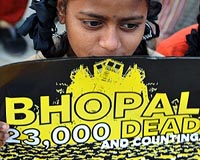| . |  |
. |
Bhopal, India (UPI) Dec 3, 2009 As activists and survivors demonstrated for justice on the 25th anniversary of the Bhopal, India, gas disaster, experts say the toxic effects continue to take a toll. On Dec. 3, 1984, a cloud of toxic gas leaked from a Union Carbide pesticide factory, killing 10,000 people within three days. Research by the Indian Council for Medical Research shows that 25,000 people have died from the consequences of exposure since 1984. About 100,000 people are chronically sick, and more than 30,000 people live in water-contaminated areas around the factory, according to government figures, the Times Online reports. India's government has previously acknowledged that about half a million people were affected by the incident, considered the world's worst industrial accident. Indian Prime Minister Manmohan Singh issued a statement describing Bhopal as a tragedy that "still gnaws at our collective conscience." He vowed to continue efforts to tackle the issues of drinking water and site decontamination, while local politicians have denied there is any problem, saying that monsoon rains washed away the contamination years ago. But a study by the U.K.-based Bhopal Medical Appeal found a number of chemicals in the local drinking water, with carbon tetrafluoride, a known carcinogen, present at 2,400 times the World Health Organization's guidelines. Concentrations of chloroform in the water are double the safety limits set the U.S. Environmental Protection Agency. Tim Edwards, a trustee of BMA, said Bhopal's groundwater contamination appears to be getting worse. "This is the real part of the iceberg. The tip is the surface waste but the real stuff is under the ground," Edwards said, Voice of America reports. "What these results suggest is that those chemicals are leeching through the soil into the rock underneath and into the local aquifers. And, as more and more of the toxins drip through the water table, the concentrations are getting stronger and stronger." And a study by the New Delhi-based Center for Science and Environment found that groundwater nearly 2 miles away from the factory site contains pesticides at 40 times higher than the Indian safety standard. Campaigners have also cited a pond several hundred yards from the factory as one of the sources of toxins seeping into the groundwater, BBC reports. Effluents from the factory -- much of it containing highly toxic chemicals -- had been dumped into the pond when the plant was in operation. The rusty, abandoned factory has not been dismantled, and campaigners say the grounds have never been properly decontaminated. The state of Madhya Pradesh took on responsibility for the site in 1998 but has yet to completely clear out the plant. Hundreds of tons of toxic chemicals are still scattered around the site, The Guardian reports. In a statement released to coincide with the anniversary, Dow Chemical, which bought Union Carbide a decade ago, said a $470 million settlement in 1989 with the Indian government had "resolved all existing and future claims" against the company. A Bhopal survivor interviewed on BBC who lost both parents in the disaster said his compensation amounted to $500. Share This Article With Planet Earth
Related Links Our Polluted World and Cleaning It Up
 Bhopal protests on 25th anniversary of killer gas leak
Bhopal protests on 25th anniversary of killer gas leakBhopal, India (AFP) Dec 3, 2009 Indian activists marked the 25th anniversary of the Bhopal gas leak disaster Thursday with protests and demands that those responsible for thousands of deaths finally be held to account. Demonstrators and survivors capped a week of commemorations with a planned march to the Union Carbide pesticide plant in Bhopal, where on December 3, 1984 a cloud of methyl isocyanate gas killed up to 10,000 ... read more |
|
| The content herein, unless otherwise known to be public domain, are Copyright 1995-2009 - SpaceDaily. AFP and UPI Wire Stories are copyright Agence France-Presse and United Press International. ESA Portal Reports are copyright European Space Agency. All NASA sourced material is public domain. Additional copyrights may apply in whole or part to other bona fide parties. Advertising does not imply endorsement,agreement or approval of any opinions, statements or information provided by SpaceDaily on any Web page published or hosted by SpaceDaily. Privacy Statement |